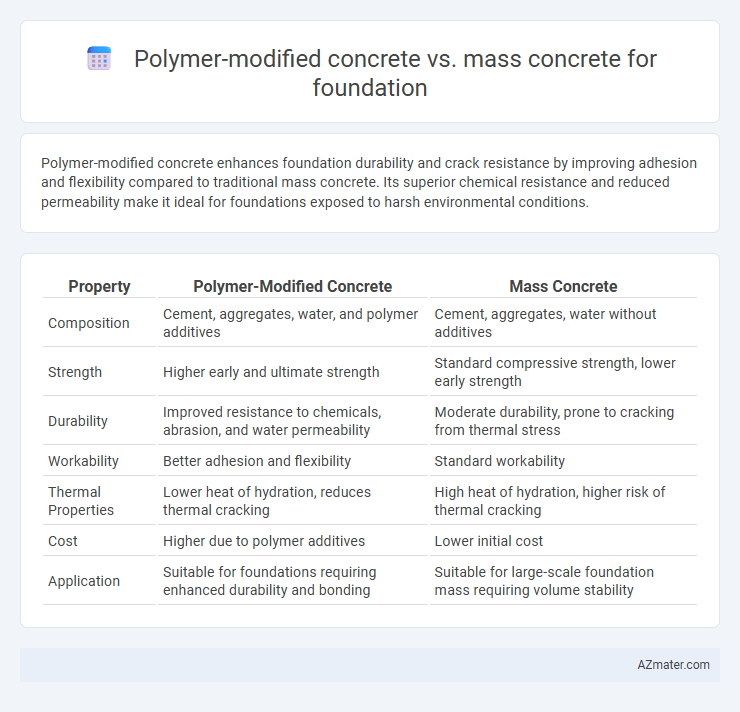Polymer-modified concrete enhances foundation durability and crack resistance by improving adhesion and flexibility compared to traditional mass concrete. Its superior chemical resistance and reduced permeability make it ideal for foundations exposed to harsh environmental conditions.
Table of Comparison
| Property | Polymer-Modified Concrete | Mass Concrete |
|---|---|---|
| Composition | Cement, aggregates, water, and polymer additives | Cement, aggregates, water without additives |
| Strength | Higher early and ultimate strength | Standard compressive strength, lower early strength |
| Durability | Improved resistance to chemicals, abrasion, and water permeability | Moderate durability, prone to cracking from thermal stress |
| Workability | Better adhesion and flexibility | Standard workability |
| Thermal Properties | Lower heat of hydration, reduces thermal cracking | High heat of hydration, higher risk of thermal cracking |
| Cost | Higher due to polymer additives | Lower initial cost |
| Application | Suitable for foundations requiring enhanced durability and bonding | Suitable for large-scale foundation mass requiring volume stability |
Introduction to Concrete Used in Foundations
Polymer-modified concrete enhances traditional mass concrete by incorporating polymers that improve adhesion, durability, and resistance to cracking in foundation applications. Mass concrete, typically used for large-scale foundations, relies on its volume and density to provide structural stability but may be prone to shrinkage and thermal cracking without modification. The choice between polymer-modified and mass concrete affects the foundation's performance under environmental stresses and load-bearing requirements.
What is Polymer-Modified Concrete?
Polymer-modified concrete (PMC) is a composite material where polymers are added to traditional concrete to enhance its properties, such as increased bonding strength, flexibility, and water resistance. Unlike mass concrete, which relies on its large volume and thermal mass for foundation stability, PMC offers superior durability and reduced permeability, making it ideal for foundations exposed to harsh environmental conditions. The incorporation of polymers improves adhesion and reduces cracking, providing a more resilient and long-lasting foundation solution.
Understanding Mass Concrete in Foundation Work
Mass concrete in foundation work involves large volumes of concrete that generate substantial heat during curing, requiring careful thermal control to prevent cracking. It is characterized by low permeability and high compressive strength, making it suitable for heavy load-bearing structures. Proper mix design and curing methods ensure durability and stability in foundations where thermal stresses and hydration heat are critical concerns.
Key Differences Between Polymer-Modified and Mass Concrete
Polymer-modified concrete incorporates polymers to improve adhesion, flexibility, and chemical resistance, enhancing durability and reducing permeability compared to traditional mass concrete. Mass concrete is characterized by its large volume and relies on heat dissipation and low water-cement ratio to prevent cracking, primarily used for heavy structural foundations. Key differences include enhanced bonding and reduced shrinkage in polymer-modified concrete, whereas mass concrete emphasizes thermal control and strength through its bulk properties.
Strength and Durability Comparison
Polymer-modified concrete enhances foundation strength by improving tensile and flexural properties compared to traditional mass concrete, making it more resistant to cracking and structural stresses. Its durability surpasses mass concrete due to superior adhesion, reduced permeability, and increased resistance to chemical attack, freeze-thaw cycles, and abrasion. Mass concrete, while cost-effective for large volumes, generally exhibits lower toughness and higher susceptibility to shrinkage and thermal stress-induced cracking over time.
Workability and Setting Time
Polymer-modified concrete enhances workability by improving flow and reducing segregation, ensuring easier placement in complex foundation forms compared to mass concrete. The setting time of polymer-modified concrete is generally faster due to the presence of chemical admixtures that accelerate hydration, whereas mass concrete often exhibits slower setting because of its larger volume and heat retention characteristics. Improved workability and controlled setting time in polymer-modified concrete contribute to better curing and durability in foundation applications.
Resistance to Chemicals and Environmental Factors
Polymer-modified concrete exhibits superior resistance to chemicals such as sulfates, chlorides, and acids due to its enhanced density and reduced permeability, making it ideal for harsh environmental conditions. Mass concrete, while durable in large volumes, is more susceptible to chemical attack and environmental degradation over time because of its higher porosity and potential for cracking from thermal stresses. Selecting polymer-modified concrete for foundations ensures prolonged structural integrity in aggressive chemical environments and fluctuating weather conditions.
Cost Implications for Foundation Construction
Polymer-modified concrete typically increases upfront costs due to the added expense of polymers and specialized mixing procedures compared to traditional mass concrete. However, its enhanced durability and reduced permeability can lower long-term maintenance and repair expenses in foundation construction. Mass concrete offers cost efficiency in large volume pours but may require additional measures to control cracking and shrinkage, potentially increasing overall project costs.
Application Areas: Best Uses for Each Type
Polymer-modified concrete excels in applications requiring enhanced durability, chemical resistance, and adhesion, making it ideal for industrial foundations, marine structures, and repair works where exposure to aggressive environments is common. Mass concrete is preferred for large-scale foundations such as dams, bridge abutments, and heavy-duty building bases due to its ability to control heat generation and prevent thermal cracking during curing. Selection between polymer-modified and mass concrete depends on project-specific structural demands, environmental exposure, and longevity requirements.
Conclusion: Choosing the Right Concrete for Your Foundation
Polymer-modified concrete offers enhanced durability, superior adhesion, and improved resistance to chemical attacks, making it ideal for foundations exposed to harsh environmental conditions. Mass concrete provides excellent structural support and thermal stability for large-scale foundations but may struggle with shrinkage and cracking without proper curing. Selecting the appropriate concrete depends on the foundation's exposure requirements, load-bearing needs, and long-term performance expectations.

Infographic: Polymer-modified concrete vs Mass concrete for Foundation
 azmater.com
azmater.com